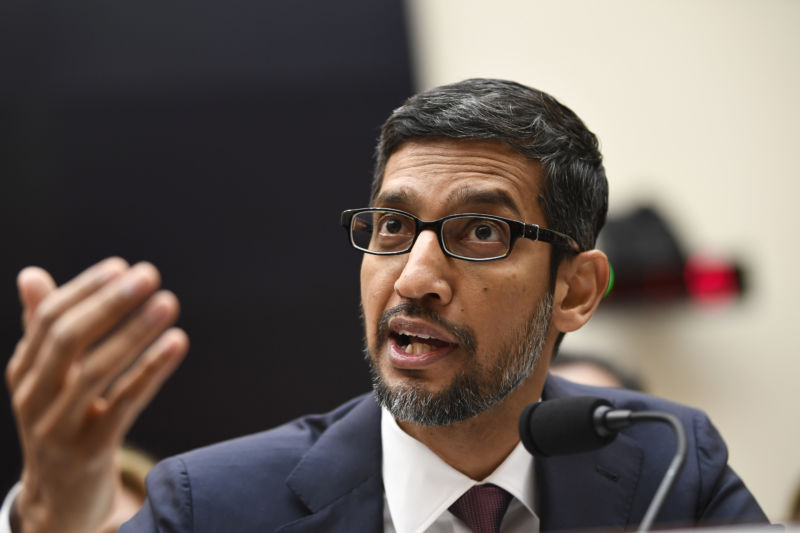
Google's hardware division has been getting beat up in the press recently. A report of internal strife over the Google Pixel 4 made the group look pretty bad, with hardware lead Rick Osterloh reportedly internally criticizing the Pixel 4 just before launch and two key executives leaving the division in the past year. Apparently, all that dissent was enough to make Google CEO Sundar Pichai come out and publicly defend the hardware group, which he did during a guest appearance on The Verge's Vergecast podcast.
Google is a huge company with billions of users, and lately (especially under Pichai's watch), it has been willing to suddenly kill any product that doesn't reach this "billions of users" benchmark. On the software side of things, we've recently seen the company execute Google Inbox, Google+, Google Hangouts, Google Music, Google Allo, YouTube Gaming, and Google Cloud Print. On the hardware side of things, we recently witnessed the death of Google Daydream VR headsets, the Google Clips camera, Chromecast Audio, Pixel tablets, and mergers that are effectively killing Nest as a standalone company.With all of these shutdowns, it would not be totally crazy to worry about the future of the Pixel line. The Pixel 3 sold less than the Pixel 2. The Pixel 4 is selling less than the Pixel 3. The cheaper Pixel 3a and 4a were supposed to save Google's smartphone line, but now the "a" series faces very tough competition from Apple's new iPhone SE. For the Pixel 5, all indications are that Google is bowing out of the top-end of the market. Things are not going well.
Speaking to The Verge, Pichai says he's taking a longer-term view of Google's hardware efforts. When asked if the Pixel line is doing as well as Google has hoped, Pichai responded:
The last couple of years have been a major integration phase for us because we've combined our Google hardware efforts with Nest. We absorbed the mobile division of HTC. So it's been a lot of stitching together. And we have a wide product portfolio, too. So it's definitely been a building phase. We're super committed to it for the long run. Hardware is hard. And it definitely has components, which take real time to get it right, thinking about underlying silicon or display or camera or any of those tacks. And so we are definitely investing in it, but that timeline. I think we've made a lot of progress.
A lack of "progress" is something we criticized the Pixel line for in our last review. Google started its own hardware line with the Pixel 1, but it's hard to point to a major process improvement Google has made in the last four years. A key problem is still a total lack of progress when it comes to sales, and that starts with availability. The Pixel 1 started Google hardware sales in only a tiny handful of countries, but four years later, the Pixel line is only for sale in 12 countries. Last time I checked, Apple sells the iPhone in about 70 countries, while Samsung sells its flagship in over 100 countries. Even if the next Pixel was a smash hit, most people would be unlikely to buy one.
If there's any area of growth in the Pixel line, it would have to be in the "underlying silicon" that Pichai mentions. But we've yet to see that really materialize into a killer feature. The Pixel 4's highest-profile custom chip, a miniaturized radar chip called "Soli," is interesting, but Google's use for it—handwaving air gestures—has poor gesture recognition and would be questionably useful even if it worked reliably. The other pieces of custom silicon will only stand out to the detail-oriented: there's a "Titan M security module" designed by Google and a "Pixel Neural Core" AI co-processor. You'd be hard-pressed to find a competition-beating benefit from these chips, though, considering that analogous components are included in high-end Snapdragon chips.All these side-project chips could be leading to something bigger, though. A recent report claimed Google was planning to develop a system SoC for a future Pixel phone that would replace the usual Qualcomm Snapdragon processor that monopolizes the high-end market. The company has been hiring chip designers from Intel and Qualcomm for some time now, and the report says the SoC could be ready as early as 2021, which could mean a Pixel 6 with a Google SoC.
Several times in the interview, Pichai mentions hardware initiatives that will take years to pay off, possibly referring to Google's chip work. "Some of the deeper efforts we are putting in will take three to four years to actually play out." Pichai told The Verge. "And when they come in, I think I'm excited about how they will shape where we are going."Pichai hinted he wasn't giving the hardware team a blank check, though, saying it's "important" to have "a clear financial sustainability goal" in hardware.
Google hardware will have its next big test when the Pixel 4a launches, which should be sometime next month.
reader comments
165